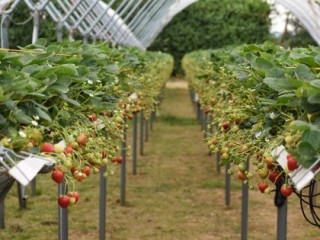
The WET Centre Consortium was launched in 2017, and draws on a century of impactful R&D outputs from East Malling to support global fruit production.
NIAB’s world-class fruit science at East Malling aims to increase marketable yields, improve berry quality and consistency, and reduce costs whilst minimising emissions to land, air and water.
The Consortium is delighted to welcome new forward-thinking members from the UK soft fruit sector who share similar high-quality aspirations
Consortium membership benefits
- Applied research to meet the needs of the consortium
- Collaboration with NIAB’s world-leading scientists
- Opportunities to become partners in research programmes
- Engagement in R&D experiments on factors affecting yield and quality
- Immediate access to results from our applied research
- Evidence and support in transitioning to net zero carbon emissions
- Workshops, training days, and technical updates for UK soft fruit agri-businesses
- Events, agronomy days, demonstrations, and open days on key issues
Recent successes of NIAB East Malling WET Centre Team
- Unrivalled success in winning funding to test new innovations
- Commercialisation of an on-demand precision irrigation system for growers
- Adopted new precision technologies to measure run-off volumes
- Data collected to inform the design of rainwater harvesting systems
- Evaluated technologies to improve crop water availability and management
- Quantified the impact of transient stress events on cane fruit productivity
- Evaluated the effects of UV-blocking film on leaf physiology, yields and berry quality
- Predicted internal polytunnel environment conditions using satellite-derived data
- Constructed detailed cropping profiles of MallingTM Fruits strawberry and raspberry varieties
Working with our industry partners to focus on:
- Fully automated precision irrigation systems
- Rainwater harvesting and re-use
- N-demand models to better target variety-specific nutrition
- Reducing run-off of water and fertilisers to lower emissions
- Measuring and mapping polytunnel environments
- Predictive models to improve crop forecasting
- Impact of light quality and availability on Class 1 yields and quality
- Substrate mixes and coir bag colour effects on productivity
- Smart tunnel venting systems to optimise the phytoclimate
- Biostimulants to improve crop resilience under low input growing systems
- Floral intervention strips for beneficial insects
If you're interesting in joining the WET Centre Consortium, or for more info please contact: wetcentre [at] niab.com (subject: WET%20Centre%20Consortium)
The WET Centre Current work Key findings WET Centre Partners
